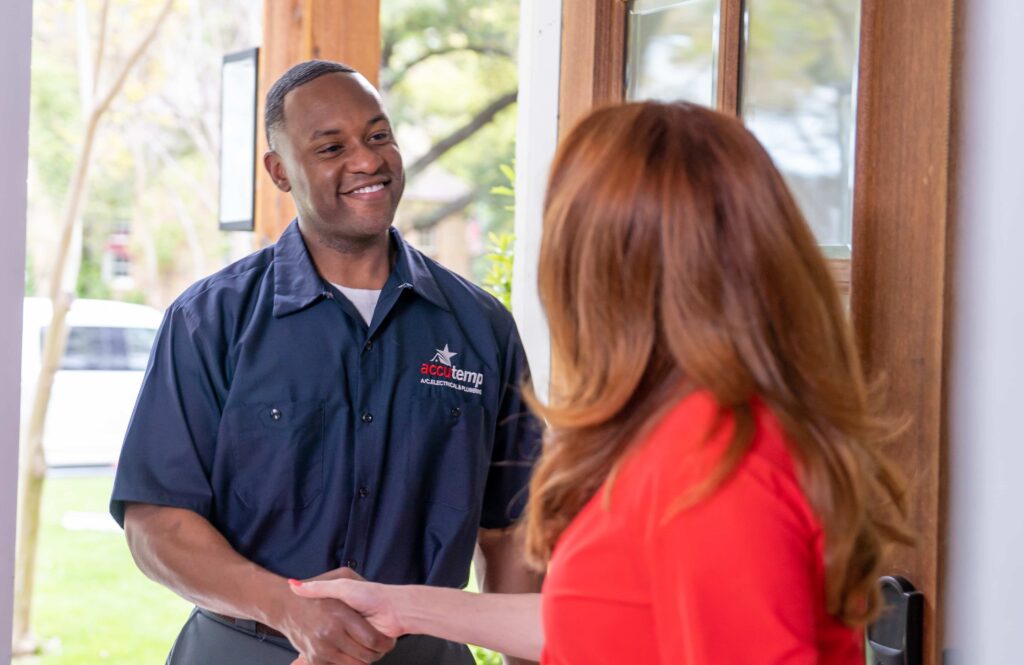
Does your home feel sticky, damp, or muggy, even with the air conditioning running? You’re not imagining it. A humid house is a sign that your AC system might not be working as it should. Below, we’ll explore the most common reasons your home feels uncomfortable and how to fix the issue for good.
Top Reasons Your House Feels Humid While the Air Conditioner Is On
Air conditioners are designed to do more than cool your home; they can also manage indoor air quality by removing moisture from the air. Although when something goes wrong, your system struggles to maintain that balance.
Here are the most common reasons your house feels humid while your air conditioner is on.
Frozen Evaporator Coils
One of the most common culprits of indoor humidity is a frozen evaporator coil. This component is responsible for absorbing heat and moisture from your indoor air. When it freezes, the coil can no longer function properly, leading to:
- Reduced cooling
- Ineffective dehumidification
- Ice buildup that blocks airflow
Frozen coils often indicate restricted airflow (such as a dirty air filter) or low refrigerant levels. If you notice ice on your system, turn off your AC immediately and contact a professional for assistance.
AC Lifespan
As your air conditioning system ages, its ability to cool and dehumidify naturally declines. Most systems are built to last 10–15 years. After that, performance drops.
An older system may:
- Run longer without effectively removing moisture
- Struggle to keep up during peak summer heat
- Cause utility bills to spike without delivering comfort
If your AC is nearing the end of its lifespan, it may be time to consider a full air conditioning replacement.
Malfunctioning Thermostat
A faulty thermostat can confuse your entire HVAC system. If it misreads the indoor temperature or fails to trigger the cooling cycle correctly, your AC may not run long enough to remove humidity.
Signs of a thermostat issue include:
- Short cycling (frequent on/off)
- Incorrect indoor temperature readings
- Uneven cooling across rooms
Upgrade to a smart thermostat or call for a tune-up to restore proper control.
Build Up of Debris
If your house feels humid while your air conditioner is on, this is a sign of dust, pet hair, and other debris in your HVAC system. When airflow is restricted, your system can’t circulate air efficiently or remove moisture as intended.
Common problem areas include:
- Dirty air filters
- Blocked vents or registers
- Dust buildup in the ductwork
Routine maintenance, including air conditioning tune-up services, can clear blockages and keep your AC working efficiently.
Incorrect HVAC System Size
If your HVAC system is too large or too small for your home, it won’t properly regulate humidity. An oversized system cools your space too quickly, shutting off before it can fully dehumidify the air. On the other hand, an undersized system runs constantly but still struggles to maintain a stable temperature and humidity level.
Signs of poor system sizing include:
- High indoor humidity despite cooling
- Short or excessive run times
- Inconsistent temperatures from room to room
A professional HVAC consultation can assess your home’s square footage, insulation, and airflow needs to determine if sizing is the issue.
Your System is Old
Beyond performance issues, old HVAC systems can develop unseen problems that affect humidity control:
- Corroded coils
- Refrigerant leaks
- Failing compressors or blower motors
If your unit is 15+ years old and you’ve noticed moisture issues, it’s likely underperforming across the board. You may be better off investing in a newer, energy-efficient model that offers better humidity regulation.

About Home Humidity
Some level of humidity in the home is completely normal. Daily routines and home design contribute to indoor moisture.
Common sources of home humidity include:
- Cooking and boiling water
- Showering and doing laundry
- Breathing and indoor plants
- Crawl spaces or basements
Even the most efficient AC system can’t eliminate humidity from every corner of your home if those sources go unchecked. That's why proper ventilation and HVAC balance are essential.
The Effects of High Humidity in Homes
Now that we’ve explored why your home feels humid when your air conditioner is running, let’s look at the effects of high humidity.
Excess indoor humidity doesn’t just feel uncomfortable—it can also lead to serious health and property issues. Understanding the risks can help you address the problem early and prevent long-term damage.
Bacterial Growth
Moist environments are ideal for mold, mildew, and bacteria. When humidity levels rise above 60%, your home becomes a breeding ground for:
- Mold spores on walls, ceilings, and furniture
- Musty odors in closets or bathrooms
- Respiratory irritants that worsen asthma or allergies
Maintaining humidity levels is crucial to creating a healthy and breathable indoor environment.
Bugs and Mites
Insects thrive in warm, moist spaces. High humidity can attract:
- Dust mites in bedding and upholstery
- Cockroaches, ants, and silverfish
- Spiders seeking damp basements or crawl spaces
If you’re battling pest problems along with a sticky indoor climate, your humidity could be to blame.
Read More: Top Reasons Your Water Heater is Not Working
Technology
Electronics and moisture don’t mix. Prolonged exposure to humidity can damage:
- Laptops and desktop computers
- TVs, gaming systems, and speakers
- Home automation devices
Rust, corrosion, and internal condensation can shorten the life of sensitive components, even if you don’t see visible damage.
Health Effects
Humidity impacts more than comfort; it can directly affect your health.
Symptoms of excess humidity include:
- Difficulty sleeping
- Increased allergy or asthma flare-ups
- Fatigue or general discomfort
For households with children, seniors, or immunocompromised individuals, regulating moisture is essential.

Professional Air Conditioning Repair Services
If your house feels humid while your air conditioner is on, give our professionals a call at (225) 244-8826 to receive support. Our team is committed to offering trustworthy air conditioning repair services in New Orleans, Louisiana and the surrounding areas.
At AccuTemp, our expert technicians provide fast, reliable solutions to restore comfort and control in your home. We specialize in:
- Diagnosing frozen coils, refrigerant issues, and poor airflow
- Optimizing thermostat performance and running AC cycles
- Evaluating system size and layout for Louisiana homes
- Recommending repairs or complete system air conditioning replacement when necessary
Whether you need an air conditioning tune-up or emergency repair, our team provides trustworthy solutions. Don’t let indoor humidity get the best of your summer. Contact AccuTemp today for a professional assessment and get back to feeling cool, dry, and comfortable at home.













